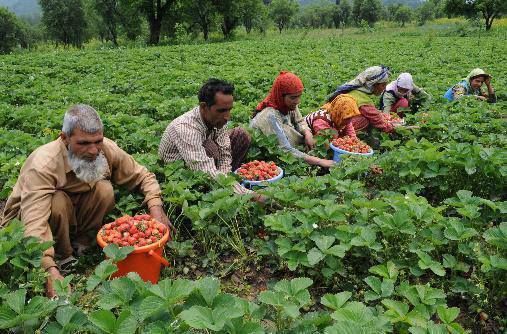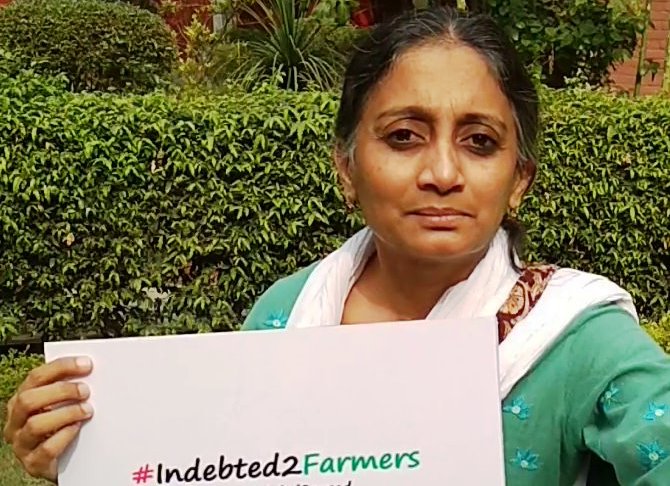The government of Jammu and Kashmir, giving a huge push to sustainable agriculture in the Union Territory, has approved a five-year project on “Innovative Extension Approaches for Revitalizing Agriculture in Jammu and Kashmir”, said a press release.
The project, worth Rs 463 crore, is aimed at empowering farmers and educated youth through technology-driven and inclusive agri-extension services. One of the critical outcomes of the project would be the creation of 2,000 Kissan Khidmat Ghars (KKGs), which will serve as a One Stop Center for extending farmer-oriented services, added the press release.
“The extension system in Jammu and Kashmir faces many challenges, including serving a large clientele with structural complexity and functional diversity. There is a significant gap between extension workers and farmers, with a ratio of 1:1100 and a contact intensity of one hour per farmer per year. The existing system is also plagued by defects such as lack of realistic base-level information, poor coordination and cohesiveness among the extension players and a low level of public confidence”, said Atal Dulloo, Additional Chief Secretary, APD.
The project aims to address these issues by developing a dynamic agri-extension system using IoT-enabled real-time big data for farm-centric planning and resource allocation. This technology-enabled system will form the basis for a proactive agriculture extension system with a cluster approach. This approach will use real-time regional analysis of climate and agro-ecology information to promote niche agriculture under given agro-climatic conditions”, he added.
“Innovative Extension Approaches for Revitalizing Agriculture in Jammu and Kashmir” is one among the 29 projects, which were approved by the Jammu and Kashmir administration after being recommended by the UT Level Apex Committee for holistic development of agriculture and allied sectors in UT of J&K. The prestigious committee is being headed by Dr Mangala Rai, former DG ICAR and has other luminaries in the field of Agriculture, Planning, Statistics and Administration like Ashok Dalwai, CEO NRAA, P K Joshi, Secretary, NAAS, Prabhat Kumar, Horticulture Commissioner MOA and FW, DH. S Gupta, Former Director, IARI, Atal Dulloo , Additional Chief Secretary, APD besides Vice Chancellors of twin Agriculture Universities of the UT.
The project envisages promoting sustainable and profitable agriculture with a significant increase in the share of agricultural GDP. To achieve this goal, the project will establish 2,000 Panchayat level KKGs, revitalizing the Block-level Extension Advisory Committee and promoting Krishi Vigyan Kendra (KVK) as a hub of convergence of services at the district level. The project will also establish business orientation centres at SKUAST-Kashmir and Jammu and facilitate real-time problem redressal through cyber extension including RS-GIS-driven agro-advisories and ICT-based virtual contacts and communication systems.
The Kissan Khidmat Ghar will be a Stop Center for farmers to access a range of services related to agriculture and allied sectors. It will serve as a knowledge centre with modern ICT tools including a kiosk, to provide direct access to various information such as input supply, technology, marketing, and more. The KKG will be a platform for a public-private partnership to manage the value chain effectively and economically. Each KKG will have a technical facilitator to provide end-to-end services to farmers at nominal charges.
The project will also create a strong MIS system to maintain transparency and accountability in service delivery and information sharing with parent departments and administration. The KKG will function in close coordination with the Panchayat, fostering the Public-Private-Panchayat partnership. The key functions of KKG will include execution of direct services in agriculture and allied sectors, input booking/delivery, market intelligence services, capacity building and skill development, facilitating custom hiring services and generating baseline information for policy planning and review of operational schemes at block and higher levels.
The project will focus on holistic planning and execution of “production to profit” agriculture with the area and commodity-specific extension approaches based on the agri-knowledge system (JK Agri stack platform). It will converge functional extension resources and approaches for participatory planning and decentralized decision making to promote remunerative agriculture. It will also provide seamless agricultural extension services with perfect outreach and dynamic contact across the value chain and real-time resource person-client interaction. Besides, the project will focus on capacity building in agricultural extension and skill development for generating entrepreneurship and employment.
Meanwhile, the project will also reorient capacity-building programs and promote secondary agriculture with post-harvest and non-farm activities as the primary focus for harnessing better returns. This will include training in agri-business, marketing, secondary agriculture and non-farm activities. It will constitute an “Agri-Extension Club” promoting regular online Expert Extension Lecture Series (EELS) and skilling farmers and youth in mission mode for profitable agriculture, entrepreneurship development, agri-business start-ups, employment generation and livelihood security.
The project will also synergize PPP extension systems and accreditation of service providers at the UT level with outcome-linked incentives. It will establish sustainable market linkages for physical and e-markets and promote secondary agriculture. The project will also focus on the augmentation of mechanization, automation and digital agriculture, awareness programs, demonstrations and entrepreneurship in farm machinery services.
The project will promote research in extension, technology and service gaps, technology adoption, and impact assessment. It will use a bottom-up approach and employ IoT-enabled real-time big data to monitor the impact of the project at the backend.
The project aims to promote a smart technology-driven seamless innovative, implementable and inclusive agri-extension service that empowers farmers and educated youth to realize the sustainably progressive growth of the agricultural sector in the country. By providing farmers with access to modern tools and techniques, the project hopes to increase agricultural productivity and improve food security while also reducing poverty and promoting sustainable development.
Ultimately, the implementation of a smart, technology-driven approach to agricultural extension services has the potential to revolutionize the way farmers access information and support. By leveraging the power of IoT-enabled big data, the project can measure the impact of its efforts in real time, providing valuable insights for future decision-making. As a result, the project has the potential to contribute significantly to the achievement of United Nations Sustainable Development Goals related to food security, poverty reduction and sustainable development, positively impacting millions of people’s lives. (ANI)
Read More:http://13.232.95.176/

